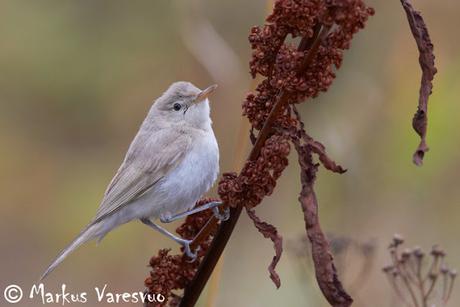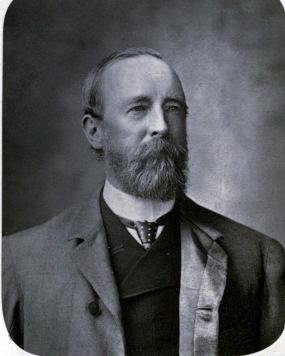A beautiful bird resembling a house sparrow – Hypolais rama is its name – pic credit www.birdphoto.fi .. …

A search took me to a book ‘ Nests and Eggs of Indian Birds (1883)’ and its author is the subject matter of today’s post having been born 192 years ago [Wikipedia puts his dob as 4.6 while Brittanica puts it as 6th June 1829) -
394. Hypolais rama (Sykes). Sykcs's Tree-Warbler. Phyllopneuste rama (Sykes), Jerd. I have never myself obtained the nest and eggs of Sykes's Tree- Warbler, P. rama, apud Jerd* On the 1st April, at Etawah, my friend Mr. Brooks shot a male of this species off a nest ; and I saw the bird, nest, and eggs within an hour, and visited the spot later. The nest was placed in a low thorny bush, about a foot from the ground, on the side of a sloping bank in one of the large dry ravines that in the Etawah District fringe the Kiver Jumna for a bread
This was one of the major works of the Bureaucrat who is to be remembered by Indian politic and it covers descriptions of the nests, eggs and the breeding seasons of most Indian bird species. It makes use of notes from contributors to his journals as well as other correspondents and works of the time. He also makes insightful notes such as observations on caged females separated from males that would continue to lay fertile eggs through the possibility of sperm storage and the reduction in parental care by birds that laid eggs in warm locations (mynas in the Andamans, river terns on sand banks).
On 15th Aug 1947 India got freedom without dropping blood, as Gandhi and Congress fought war of ahimsa – later the Country was ruled for decades by Jawaharlal Nehru and his clan .. ..
We never studied nor understood that Indian National Congress was started much earlier, had its first session in Bombay in Dec ecember 1885 at the initiative of retired Civil Service officer Allan Octavian Hume. Its aim was to obtain a greater share in government for educated Indians, and to create a platform for civic and political dialog between them and the British Raj. Hume organised the first meeting in Bombay with the approval of the Viceroy Lord Dufferin. Umesh Chandra Banerjee was the first president of Congress; the first session was attended by 72 delegates. It was an elitist group and not a mass movement
After retiring from the civil services and towards the end of Lord Lytton's rule, Hume observed that the people of India had a sense of hopelessness and wanted to do something, noting "a sudden violent outbreak of sporadic crime, murders of obnoxious persons, robbery of bankers and looting of bazaars, acts really of lawlessness which by a due coalescence of forces might any day develop into a National Revolt." Concerning the British government, he stated that a studied and invariable disregard, if not actually contempt for the opinions and feelings of our subjects, is at the present day the leading characteristic of our government in every branch of the administration. There were agrarian riots in the Deccan and Bombay, and Hume suggested that an Indian Union would be a good safety valve and outlet to avoid further unrest. On 1 March 1883 he wrote a letter to the graduates of the University of Calcutta – whom are we talking about ?
Allan Octavian Hume, CB ICS (1829 – 1912) was a British member of the Imperial Civil Service (later the Indian Civil Service), a political reformer, ornithologist and botanist who worked in British India. He was one of the founders of the Indian National Congress. A notable ornithologist, Hume has been called "the Father of Indian Ornithology"

In 1867 Hume became Commissioner of Customs for the North West Province, and in 1870 he became attached to the central government as Director-General of Agriculture. In 1879 he returned to provincial government at Allahabad. Lord Mayo rewarded him with the Secretaryship to Government in the Home, and afterwards, from 1871, in the Revenue and Agricultural Departments.
Hume had sailed to India in 1849 and the following year, joined the Bengal Civil Service at Etawah in the North-Western Provinces, in what is now Uttar Pradesh. His career in India included service as a district officer from 1849 to 1867, head of a central department from 1867 to 1870, and secretary to the Government from 1870 to 1879. He married Mary Anne Grindall in 1853.
NINE years after his entry to India that Hume faced the Indian Rebellion of 1857 during which time he was involved in several military actions for which he was created a Companion of the Bath in 1860. Initially it appeared that he was safe in Etawah, not far from Meerut where the rebellion began but this changed and Hume had to take refuge in Agra fort for six months. Nonetheless, all but one Indian official remained loyal and Hume resumed his position in Etawah in January 1858. He built up an irregular force of 650 loyal Indian troops and took part in engagements with them. Hume blamed British ineptitude for the uprising and pursued a policy of "mercy and forbearance". Only seven persons were executed at the gallows on his orders. The district of Etawah was restored to peace and order in a year, something that was not possible in most other parts.
Hume rose in the ranks of the Indian Civil Service but like his father Joseph Hume, a radical member of parliament, he was bold and outspoken in questioning British policies in India. He rose in 1871 to the position of secretary to the Department of Revenue, Agriculture, and Commerce under Lord Mayo. His criticism of Lord Lytton however led to his removal from the Secretariat in 1879.
He founded the journal Stray Feathers in which he and his subscribers recorded notes on birds from across India. He built up a vast collection of bird specimens at his home in Shimla by making collection expeditions and obtaining specimens through his network of correspondents. Following the loss of manuscripts that he had long been maintaining in the hope of producing a magnum opus on the birds of India, he abandoned ornithology and gifted his collection to the Natural History Museum in London, where it continues to be the single largest collection of Indian bird skins. He was briefly a follower of the theosophical movement founded by Madame Blavatsky. He left India in 1894 to live in London from where he continued to take an interest in the Indian National Congress, apart from taking an interest in botany and founding the South London Botanical Institute towards the end of his life.
With the murder of Lord Mayo in the Andamans in 1872, Hume lost patronage and support for his work. He however went about reforming the department of agriculture, streamlining the collection of meteorological data and statistics on cultivation and yield. Lord Lytton's foreign policy according to Hume had led to the waste of "millions and millions of Indian money". Hume was critical of the land revenue policy and suggested that it was the cause of poverty in India. The Government of Lord Lytton dismissed him from his position in the Secretariat. In 1879, demoted, he left Simla and returned to the North-West Provinces as a member of the Board of Revenue. Hume retired from the civil service only in 1882. In 1883 he wrote an open letter to the graduates of Calcutta University, having been a fellow of the University of Calcutta from 1870, calling upon them to form their own national political movement. This led in 1885 to the first session of the Indian National Congress held in Bombay.
AO Hume’s father - Joseph Hume FRS (1777 – 1855) was a Scottish surgeon and Radical MP. In 1812, he purchased a seat in Parliament for Weymouth, Dorset, England, and voted as a Tory. When the parliament was dissolved the patron refused to return his money, and Hume brought an action to recover part of it. Hume married Maria Burnley, the daughter of an East India Company director, and had nine children, the eighth of which was Allan Octavian Hume, the notable ornithologist and founder of the Indian National Congress.
Most would associate Indian National Congress with Nehrus and Gandhis .. .. The Indian National Congress conducted its first session in Bombay in December 1885 at the initiative of retired Civil Service officer Allan Octavian Hume. Its aim was to obtain a greater share in government for educated Indians, and to create a platform for civic and political dialog between them and the British Raj. Hume took the initiative, and in March 1885 a notice convening the first meeting of the Indian National Union to be held in Poona the following December was issued. Due to a cholera outbreak there, it was moved to Bombay. Hume organised the first meeting in Bombay with the approval of the Viceroy Lord Dufferin. Umesh Chandra Banerjee was the first president of Congress; the first session was attended by 72 delegates, representing each province of India. Notable representatives included Scottish ICS officer William Wedderburn, Dadabhai Naoroji, Pherozeshah Mehta of the Bombay Presidency Association, Ganesh Vasudeo Joshi of the Poona Sarvajanik Sabha, social reformer and newspaper editor Gopal Ganesh Agarkar, Justice K. T. Telang, N. G. Chandavarkar, Dinshaw Wacha, Behramji Malabari, journalist and activist Gooty Kesava Pillai, and P. Rangaiah Naidu of the Madras Mahajana Sabha. This small elite group, unrepresentative of the Indian masses at the time, functioned more as a stage for elite Indian ambitions than a political party for the first decade of its existence.
Not many remember or know Allan Octavian Hume, though the party he created went on to rule India for decades
with regards – S. Sampathkumar6th June 2021.

